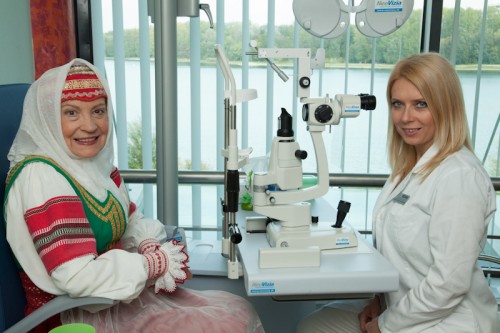The pre-operative examination before a cataract surgery
In order to be able to find the best solution for you, we need to get to know your eyes in a very detailed manner. To achieve that, we will be using the results of your detailed pre-operative examination.
Before the cataract surgery, you will need to undergo a detailed pre-operative examination. This examination si completely painless but you will not be able to drive a car after it, since special eye drops will dilate your pupils.
What does the pre-operative examination before a cataract surgery look like?
- It starts with a so- called patient history. A professional nurse will be asking you detailed questions and exploring all optical errors and other diseases in your family – for example, whether you or any of your family members suffer from diabetes, high blood pressure, allergies or similar problems, and all medications that you take.
- She will also measure the glasses you are currently using and will test your reading skills with and without glasses.
- On the autorefractometer, she will measure your refractive errors – the dioptric error of your eye and your intraocular pressure. The measurement of the intraocular pressure is very important at any age, because a higher intraocular pressure can signal a higher risk of glaucoma.
- Furthermore, the biometric examination will follow as part of your pre-operative examination, where we will measure your eye and the results of the measurement will be used as entry parameters for the calculation of your new artificial intraocular eye lens, which will be implanted into your eye during the cataract surgery.
- In case your cataract is already at an advanced stage and some data cannot be measured accurately due to a too hazy eye lens, we will use a sonographic examination of the eye. Afterwards, the examination on the pentacam will follow – which measures the anterior segment of the eye (the anterior chamber, the corneal curvature and others).
- Other very important examinations of the posterior segment of the eye are performed after the dilation of the eyes. The professional nurse will administer eye drops into your eyes, which will dilate your pupil. The eye drops are completely painless. First, the nurse will make a photograph of your retina. In this step of the examination, we will uncover any potential hidden bleedings or damage to the retina, as well as the sneaky disease ARMD (the makular degeneration of the retina).
- You will end your entry examination with an examination and a consultation with a professional eye doctor, who will perform a detailed examination of the posterior eye segment of the eye. This doctor will be the one with whom you will be discussing and choosing the best treatment option for your cataract.

Modern eye medicine has a very broad spectrum of possibilities for the treatment of cataract, which is why we can offer you not only the removal of your cataract, but also a significant improvement of your vision. Thanks to above- standard (aspheric, toric and multifocal) eye lenses, we can help you get rid of your dependence on glasses, astigmatism and other problems in just one single surgical procedure. Ask your doctor about them during your entry examination, or contact us directly.
What you need to bring to the entry examination with you:
- A list of medications you currently take
- The glasses you currently wear
